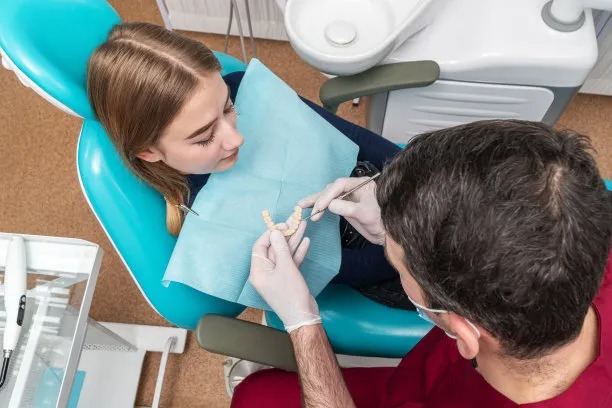Summary: Dental fillings are essential for restoring optimal oral health after decay or damage to teeth. This article outlines crucial precautions to take before and after getting a dental filling, ensuring a smooth experience and long-term health benefits. We will discuss personal preparation, understanding filling materials, post-treatment care, and follow-up practices. By adhering to these guidelines, patients can minimize discomfort, promote healing, and maintain their dental health effectively.
1. Prepare Yourself Mentally and Physically

Before getting a dental filling, it is important to prepare yourself mentally and physically. Understand that dental procedures are common, and dental professionals are trained to ensure your comfort during the process. Familiarizing yourself with the procedure can help ease anxiety. Consider speaking with your dentist about what to expect, as this will help you manage your expectations better.
Additionally, a list of questions you might have about the procedure can help alleviate any concerns you have. Bring this list with you to your appointment and dont hesitate to ask the dentist questions. The more informed you feel, the less anxious you will be.
Physically, ensure you are well-rested and have eaten something light prior to the appointment. This can help you feel more stable and focused during the procedure, setting you up for a successful experience.
2. Understand the Types of Filling Materials
Before your appointment, it is essential to understand the various types of filling materials available. Common options include amalgam, composite resin, porcelain, and glass ionomer. Each type has its own benefits, such as durability, aesthetics, and biocompatibility.
Composite fillings, for example, are often chosen for their ability to blend seamlessly with the natural color of your teeth. This may be a priority for front teeth or for patients conscious about their appearance. In contrast, amalgam fillings are made from a mixture of metals and are known for their strength, making them ideal for back teeth that endure significant pressure from chewing.
Being well-informed about the materials can help you make the best choice for your filling and discusses your preferences or any concerns with your dentist ahead of time.
3. Post-Treatment Care for Successful Recovery
The steps taken after receiving a dental filling are equally important for your oral health. Once the filling is complete, you may experience some numbness from the anesthesia, so avoid chewing or biting your cheek until the feeling returns. This helps prevent accidental injuries inside your mouth.
Be mindful of the foods you eat in the first 24 hours after getting a filling. Soft foods are advisable, as they minimize irritation to the filled tooth. Also, steer clear of extremely hot or cold foods until you see how your tooth reacts post-treatment. Some patients might experience temporary sensitivity, which usually diminishes with time.
Maintaining proper dental hygiene after the procedure is crucial. Brushing gently around the filling and avoiding flossing directly on it for a few days can aid in preventing discomfort and possible displacement of the filling material. Remember to continue visiting your dentist for regular check-ups to monitor the condition of your fillings.
4. Importance of Follow-Up and Maintenance
The importance of follow-up appointments cannot be overstated. These visits allow your dentist to assess the integrity of the filling and the health of the surrounding gums and teeth. Regular check-ups can catch any issues early, preventing further damage and ensuring your overall oral health is maintained.
Additionally, understand the lifespan of your filling material. Amalgam fillings can last over a decade, while composite fills generally last about five to seven years. Being aware of these timelines allows you to plan accordingly for replacements if needed.
Lastly, maintain a good at-home oral care routine by brushing twice daily and flossing daily. This commitment extends the life of your fillings and helps prevent further decay or damage to your teeth. A proactive approach to oral health conserves your investment in these restorative treatments.
Summary:
In conclusion, taking essential precautions before and after getting a dental filling is critical for optimal oral health. Preparing yourself mentally and physically can ease anxiety and set you up for a smoother experience. Understanding the types of filling materials helps ensure you make the right choice suited to your needs. Post-treatment care contributes to a successful recovery, and regular follow-ups maintain your overall dental health. Trust in these precautions to enhance your dental experience.
This article is compiled by Vickong Dental and the content is for reference only.
Vickong Dental
Vickong Dental is a large medical group established in Hong Kong in 2008 by professors from well-known medical universities in Guangdong and Hong Kong, as well as medical doctors from key national '985' universities (including Master's supervisors and senior professors). The chain of branches brings together expert dentists with PhDs and Master's degrees from Hong Kong and Mainland China, committed to providing high-quality dental treatment.
"Vickong Dental Practices the University Motto of 'Healing and Serving Society,' with a Stable Operation for Sixteen Years. It Has Been honored with Hong Kong Enterprise Leaders's Choice,' and is a Global Trusted Implant Center for the Nobel Implant System. Recommended by Hong Kong Metro Broadcast and Guangdong Television, it Serves Customers from Over Thirty Countries and Regions, Gaining the Trust and Favor of Citizens from the Guangdong-Hong Kong-Macau Greater Bay Area and Surrounding Cities.

Thousands of customers' unanimous praise
The most recognized and highly recommended dental service by customers in the Guangdong-Hong Kong-Macau Greater Bay Area
We Ensure You Receive Detailed Care and Attention Here
Hong Kong standards, Shenzhen prices, Your Trusted English-speaking dentists

Vickong Dental Medical-Grade Instrument Disinfection Process
Vickong Dental Medical-Grade Instrument Disinfection Process

Vickong Dental Chain: A Warm and Comfortable Environment for Treatment






Appointment Hours

Q&A
Why choose Vickong Dental?
Vickong Dental practices the university motto 「Medicine to Benefit Society」, with each branch bringing together highly qualified dentists with doctoral and master’s degrees from Hong Kong and the Mainland, and has maintained seventeen years of steady operation。Recipient of 「2024 Hong Kong Enterprise Leaders Brand」, 「2025 Hong Kong Enterprise Leaders Brand」, a Nobel Biocare Global Trusted Implant Center, and a brand recommended by Metro Radio Hong Kong and Guangdong TV。
To date, we have served customers from more than thirty countries and regions,earning exceptionally high word-of-mouth recognition and trusted recommendations from residents across the Guangdong-Hong Kong-Macao Greater Bay Area and surrounding cities
We have eight major branches in Zhuhai、Shenzhen,and a consultation and service assurance center in Hong Kong,so you can book a free consultation at any time for any questions,which is very reassuring.
If I do not accept the quotation after the CT scan, will I be charged??
No! As long as the actual treatment has not started, you will not be charged any fees.
Will there be any additional charges during the treatment process?
No, there won’t be any additional charges. Before treatment begins, we will clearly explain the treatment plan and its corresponding fees. Only after the patient agrees and signs the consent form will we proceed with the dental service.
Can I pay in Hong Kong dollars?
Yes. Vickong Dental accepts payment in Hong Kong dollars. The amount will be converted based on the exchange rate of the day, and the applicable rate will be clearly communicated to you in advance.
Can I reschedule my appointment at any time?
Yes. Please contact us via **WeChat** or **WhatsApp** as early as possible, providing your original appointment time and details, along with your preferred new date and time slot for rescheduling.













